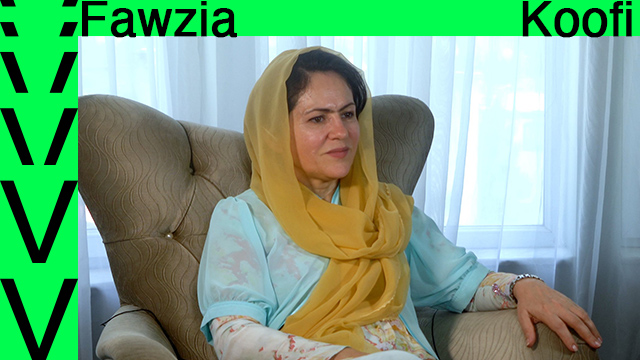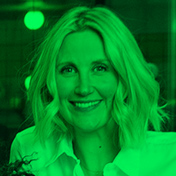
Women's Rights Trailblazer
Fawzia Koofi / Politician, Women's Rights Activist
Fawzia Koofi was the first female Vice President of Afghanistan's National Assembly. The Nobel candidate has been fighting for women's rights for 20 years as the Taliban takes over the country.
Here's what we talk about in this episode: Afghanistan, Gender, Women's rights, Life lessons, Human rights
*You will leave the NHK WORLD-JAPAN website
Draft transcript
- Alex Steullet / Host:
- I'm Alex Steullet, and this is Vision Vibes. This story was originally broadcast on television as part of NHK WORLD-JAPAN's interview series Direct Talk.
- If you grew up in a stable democracy like I did, there might be some basic rights you take for granted. For example, I'm not afraid to give my opinions because I know my speech is protected.
- But that freedom of expression is far from universal.
- Would I still speak my mind if it meant risking my own safety, or even my life? Honestly, I don't know if I would be that brave.
- But I do know that today's guest is. She has been fighting for the rights of women and girls in Afghanistan for decades. Fawzia Koofi is a politician, human rights defender, and the first female Vice President of Afghanistan's National Assembly.
- Fawzia has dedicated her career to improving the lives of women throughout her country. In doing so, she was openly critical of the Taliban, knowing she was putting her personal safety at risk. Regardless, she persists.
- What fuels her activism? What challenges has she faced? What is she doing to help the women and girls of her country? Let's join narrator Gene Otani and find out on this episode of Vision Vibes.
- Joe Biden / US President:
- Last night in Kabul, the United States ended 20 years of war in Afghanistan, the longest war in American history.
- Gene Otani / Narrator:
- On August 2021, the Taliban took over Afghanistan as the U.S. withdrew its troops.
- Fawzia Koofi is a politician who has been fighting for womens' rights for 20 years. She served as the first Vice President of the National Assembly in a country where there was discrimination against women.
- Fawzia Koofi:
- This is my country. I have stayed here all my life. I stayed here in good times of Afghanistan. The country, people give me so much love, so much support, so much respect.
- I need to return it to people when they are in difficult time. We will continue to stand for our rights. We will continue to make Afghanistan a better place not only for its male citizen but its female citizen as well.
- Gene Otani / Narrator:
- Koofi became a Nobel Peace Prize candidate…putting her life in danger for protecting freedoms for women and criticizing the Taliban.
- She was able to talk to us right before the Taliban took over Kabul. Koofi shared us her sentiments on Afghanistan.
- Women's rights were severely limited during the five years the Taliban ruled the country from 1996. Education and employment for females were restricted…and they had to wear a burqa that covers the entire body.
- In 2005, Koofi became a member of parliament and started activities to protect women's rights after the U.S. intervention in Afghanistan that led to the collapse of the Taliban administration.
- Support started for educating women, providing classes for reading and writing. The move was intended to raise the lowest female literacy rate in the world.
- Koofi helped enact laws to protect women from physical and sexual crimes.
- Rights for women were dramatically improved during the 20 years.
- Fawzia Koofi:
- After fall of Taliban, I think it's a golden era for women of Afghanistan because women were part of all the processes. There is a constitution that ensures equality for every citizen. Women members of Parliament engaging politics, even some of them run for presidency. Out of 11 million children that were in school 40% were girls.
- In the parliament also, we try to approve laws that protect women from violence, protect women from harassment, empowers women politically. In the past 15 years that I was in the parliament, we tried to approve laws that protect women and children.
- Some of the laws are now enforced. However, I think major achievement of the past 20 years is the generation transformation. Afghanistan has transformed, most part of it, from a conservative society to an open society.
- It's the transformational change that is happening in Afghanistan. The transformational change is something that Taliban must respect.
- That means people care about future. People are aware of their rights. So, the transformational change is the major achievement of the past 20 years that we hope will not reverse.
- Gene Otani / Narrator:
- Koofi has been in the forefront of protecting women's rights. She has become a target of the Taliban numerous times due to her activities. Last year, she barely survived a gun shot in her right arm.
- Yet, she continued to address women's rights on behalf of the government that was negotiating peace with the Taliban.
- Koofi became a candidate of the Nobel Peace Prize for her bravery in trying to change society and giving hope to women.
- Fawzia Koofi:
- Here in Afghanistan, we are doing our part. We are trying to talk, have gathering, have meetings, express our views, you know, use media, use whatever platform we have to express our concerns. We meet politicians, we meet international community, group of women, we try to document and raise those cases of women's rights violations. And we will continue to serve even if that means that I'm no longer there. There will be others come up. Trust me. If I stand in my values and if I'm not there anymore because of my values, because I think of this country, there will be others that will follow me, there will be others that rise, there will be others that come up.
- We are doing our part taking all the risks in Afghanistan. It is not easy nowadays even walking on the street. But we are doing it for the sake of our country. Because this is our country. We have to do it.
- Gene Otani / Narrator:
- Today many men support Koofi's mission. But she grew up in an environment where women were targets of violence and discrimination.
- Fawzia Koofi:
- When I was born as a girl, nobody was happy in my family. Even my mother was not happy because I was a woman.
- I also grew up in a family that my father was also multi-marriage. I have seen in front of my eyes how violence against women happened, how my sisters were treated, how my mother was treated.
- During the civil war in Taliban time, how women were whipped, they were beaten up, physical abuse, and how women were deprived basic, basic liberty, how women of families were victim of violence, of physical abuse, of beating, of depriving them from the access to the property rights, etc. So, all of this actually motivated me. My personal experience.
- Gene Otani / Narrator:
- One of the reasons Koofi started the women's liberation movement was to give back to her mother, who provided her with education.
- Fawzia Koofi:
- My mother was not educated. She was an illiterate women. But she was such a strong woman.
- After my father was killed in a peace mission also, and he was a member of parliament, she took care of whole children, took care of the whole family. She has helped me to get education. And she was always telling me "You will become something in the future." I never knew what something means. But I always believed what she said. After she passed away, I have committed myself that I will become something that my mother dreamed of. And becoming something means to help people getting out of the horrible life they have right now.
- Gene Otani / Narrator:
- 20 years of hard work yet resulted in a harsh reality.
- The Afghan government collapsed and was reinstated by the Taliban. This has led to massive confusion in the country.
- Koofi's message on social media was filled with sadness when the Taliban took over Kabul.
- Koofi was put under house arrest as the Taliban took control.
- She had no choice but to flee Afghanistan as there was nothing left she could do.
- We were able to get in touch with Koofi once she was outside of the country to ask her about her thoughts.
- Fawzia Koofi:
- I always believed that there is no solutions to military means and there is always a way that we could agree peacefully. But unfortunately, it didn't happen the way we wanted. And the country basically shattered and collapsed militarily which was for me who actually contributed everything in Afghanistan, it was painful and hurting individually and personally as well. Now, Taliban announced their cabinet, so to say, no women, no religious minorities, all of people who have been in the list of sanctions of the United Nations. Most of them don't know how to govern. They don't have any experience. With the history of Taliban being oppressing the nation, I see little hope, unfortunately.
- Gene Otani / Narrator:
- Women are holding demonstrations in various parts of Afghanistan. They are calling for their rights to be protected.
- Fawzia Koofi:
- I think they will continue. I think there will be more civil process. I think people will disobey the oppression. I think people will continue to ask for their rights. I will hopefully join them. We will continue to ask for our rights although I know that will have a little impact. But that's empowered generation, transformed generation. My only hope is the people. Otherwise, what's going on, everyone is very disappointed.
- Unidentified reporter:
- You want to join the women in the protest. Are you planning to do that in the near future?
- Fawzia Koofi:
- Depending on how the flights would resume because there is no flights now. So, I will watch the situation. My plan is to go back to Afghanistan. As soon as things have become a little bit settled, I will then coordinate with my people. I will go back. That's the plan. But I will see when is the appropriate time.
- I will continue to stay politically active and engaged and try to change the society, mobilized society from inside so that we could raise the awareness and inform the world about what is happening in Afghanistan and continue to push inside for a change.
- Gene Otani / Narrator:
- Koofi is now meeting with leaders from around the world. She is asking for cooperation in order to save the women of Afghanistan.
- Fawzia Koofi:
- The image of Kabul airport shocked the world and brought us to this realization that by closing our borders, problem does not end. Let's open our hearts and unite our arms toward for a better world that is safer for all.
- We cannot say that Afghanistan is segregated from the rest of the world. If Afghanistan becomes the place where its women do not have space to express their views or liberty, trust me, Afghanistan once again will become a safe haven for military extremism. So, women's liberty, women's participation is directly connected to the world security to the world safety. And therefore, I think, the world leaders should take this matter seriously.
- And Afghanistan that every citizens will have the right to equal respect regardless of their gender, regardless of their religion, regardless of their ethnical affiliation. They should be respected as a human being in peace and harmony. That is the Afghanistan I'm dreaming for. And that is my motivation. I'm hoping that one day, I'll survive to see the Afghanistan that I'm dreaming for.
- Gene Otani / Narrator:
- Koofi left us with these final words.
- Fawzia Koofi:
- A true heart. I always believe that speaking from your heart, you reach the heart of your audience. So, being genuine, being authentic, and being true to yourself, it will certainly make you to be true to your people and to everybody else. A true heart.
- Alex Steullet / Host:
- A true heart. Despite everything that has happened and continues to happen in Afghanistan, Fawzia's true heart still radiates with kindness and compassion.
- Her story shows that even in the face of overwhelming oppression, the desire for freedom and equality can never be extinguished.
- Fawzia's lifelong dream to help the women and girls of Afghanistan live the life they deserve will probably take a long time. A lot of the progress she achieved is coming undone at the hands of the Taliban.
- Yet in the end, I truly believe she will triumph.
- As Martin Luther King famously said: the arc of the moral universe is long, but it bends toward justice. People like Fawzia keep society moving along that arc. And it's the moral responsibility of the rest of us to tell her story, raise our voices, and support her in her struggle.
- Not just her, but everyone like her, whose true hearts beat to make our world a better place.
- That's it for today's episode. Thank you for listening. You can find the transcript, as well as our other stories, on the NHK WORLD website. I'm Alex Steullet. Join us next time for more mind-expanding insights from inspiring people on Vision Vibes.
- Released on November 18, 2021
- Available until October 8, 2024
Hosts

Alex Steullet
Alex is a Swiss writer, content creator and brand communication specialist. He was born in the USSR, grew up in the United States and Switzerland, and obtained his Master's degree in human rights law in the UK. Alex started his career at the Swiss Federal Department of Foreign Affairs, where he worked for three years on humanitarian and human rights issues. In 2016, he moved to Japan. Nowadays when he isn't writing or traveling, Alex can usually be found singing his heart out at karaoke.

Chloe Potter
Chloe Potter is a broadcast journalist from London. Before moving to Tokyo in February 2020 she ran her own video production company, making content for Google, Sky, the BBC and Bloomberg. Prior to that she was a presenter for Sky News and Sky Arts. She regularly records voice overs and works as a correspondent for a British broadcaster and as a freelance presenter. She has 3 children, loves wild swimming and is an avid podcast fan.
